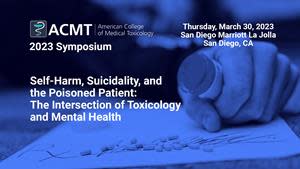Symposium to Address Suicidality, Bridging Toxicology and Mental Health
American College of Medical Toxicology (ACMT) symposium will address the ethics, psychology, management, and global epidemiology of the suicidal patient through a toxicology lens.
2023 ACMT Symposium | Self-Harm, Suicidality, and the Poisoned Patient: The Intersection of Toxicology and Mental Health

Phoenix, AZ, Dec. 09, 2022 (GLOBE NEWSWIRE) -- After a 2-year hiatus from in-person activities, The American College of Medical Toxicology (ACMT) is pleased to present a full-day symposium exploring the intersection of medical toxicology and mental health. The event, titled “Self-Harm, Suicidality, and the Poisoned Patient: The Intersection of Toxicology and Mental Health,” will take place on Thursday, March 30, 2023 at the San Diego Marriott La Jolla. This activity precedes ACMT’s 2023 Annual Scientific Meeting, a three-day conference taking place at the same location.
Learn more and register for the Symposium here.
Suicide is a major public health problem and leading cause of preventable death. The practice of medical toxicology often involves caring for patients who injure themselves (or attempt injury) by poisoning. Toxic exposures may affect the central nervous system, cause neuropsychiatric symptoms, and increase the likelihood of future suicidal behavior.
"Toxicologists interact on a daily basis with patients who have myriad mental health problems, and in many cases those sufferings increase the risk of suicide,” says symposium organizer Mark Su, MD, MPH, FACMT. “As providers for patients with intentional xenobiotic exposures and suicide attempts, the toxicology community must be cognizant of these complex issues and understand substantive ways to address them in real time."
This symposium will discuss the ethics, psychology, management, and global epidemiology of the suicidal patient through the toxicology lens. Clinicians will also learn about lethal means restriction, care of the “frequent attempter,” and strategies to prevent death by suicide. Ultimately, the course will hopefully help us better understand the suicidal toxicology patient and improve their care.
This program brings together distinguished experts in Medical Toxicology, Psychiatry, Emergency Medicine, Medical Ethics, Military Medicine, Addiction Medicine, Public Health and related fields.
Topics include:
Ethical Issues in Treatment and Research
Ethical Allocation of Resources: Transplant and the Suicidal Patient
Psychology of Suicidal Behavior and Access to Means
The Role of Medical Toxicology in Prevention of Suicidality
The High Utilizer and Recurrent Suicidality
Special Populations: Neuropsychiatric Consequences of Military and Occupational Exposures
The Intersection of Forensic Toxicology & Suicide: How To Determine Death by Suicidal Intent
The event will conclude with “A Global Perspective on Suicide by Self-Poisoning” panel featuring international medical and public health experts representing the U.S., Scotland, Lebanon, Australia, and France.
The American College of Medical Toxicology (ACMT) is a professional, nonprofit association of physicians with recognized expertise and board certification in medical toxicology. Our members specialize in the prevention, evaluation, treatment, and monitoring of injury and illness from exposures to drugs and chemicals, as well as biological and radiological agents. ACMT members work in clinical, academic, governmental, and public health settings, and provide poison control center leadership.
Attachment
CONTACT: Jessica Irving American College of Medical Toxicology (844) 226-8333 ext. 710 communications@acmt.net


 Yahoo Finance
Yahoo Finance 